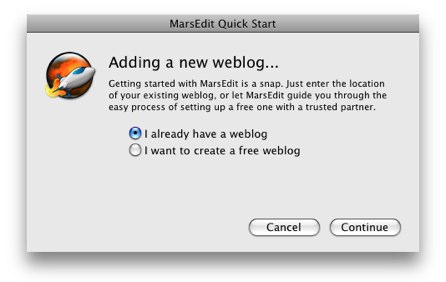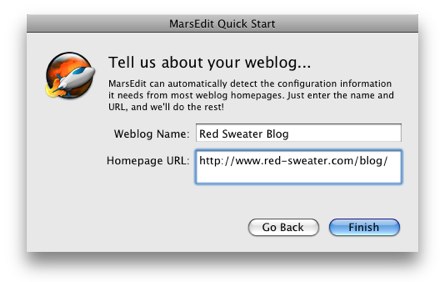Things Are Happening
January 31st, 2008I’ve been so busy working on the next release of MarsEdit that I haven’t had a lot of time to do much else, aside from my normal second job as head of customer support!
But I’ve been seeing a lot of exciting things happening, and I want to help spread the word, along with my modest commentary. This is going to sound sort of like an annual holiday letter. And in a way, it is one, even if it only covers the events of the past few weeks, and even if it’s not about my family. Well, it’s about my indie development family.
Gus Mueller, developer of VoodooPad and more recently Acorn, has reached a milestone in the development of his business, Flying Meat. He just announced that he has hired his first part-time employee. Congratulations, Gus. I’m sooooooo jealous.
Chris Liscio quit his full-time, stable job, and took a leap into the indie pool. Chris is the author of the Apple Design Award Runner-Up application Fuzzmeasure Pro, apparently a must-have for audio acoustic analysis. Lots of luck to Chris moving forward. Here’s to a break-even first year!
Rogue Amoeba also knows a thing or two about building impressive audio applications, and they’ve just updated Nicecast with Leopard support. Nicecast makes it easy, no scratch that, makes it possible to transmit streaming audio from your Mac to just about anywhere in the world.
Jon Trainer, one of my developer buddies from here in the greater Boston area, has just released a significant update to his LicenseKeeper software. The application is dedicated to keeping track of all of your software registration codes. Which will need organizing once you’ve added all these killer indie products to your virtual shelf!
IconFactory has been hard at work with partners Panic and ARTIS Software. A few weeks ago they came out with an incredible update to CandyBar, designed to both organize your icon collection, and facilitate replacement of system icons and dock graphics at your discretion. Yesterday they struck again again with an update to xScope, an incredibly intuitive and powerful on-screen measurement and design assistant.
Ian Baird released a beta and is inching closer to a full 1.0 release of his brand-new application, Changes. Somebody needed to tackle the problem of “building a better file comparison app” and it looks like Ian decided it might as well be him. I consider myself something of a god-father to this product, because I suggested the incredibly perfect name.
Oh, and Red Sweater Software will also be releasing an updated product soon. MarsEdit 2.1 is a modest update that addresses a few very common feature requests. Coming very soon to a website near you. This one!



